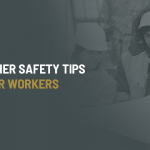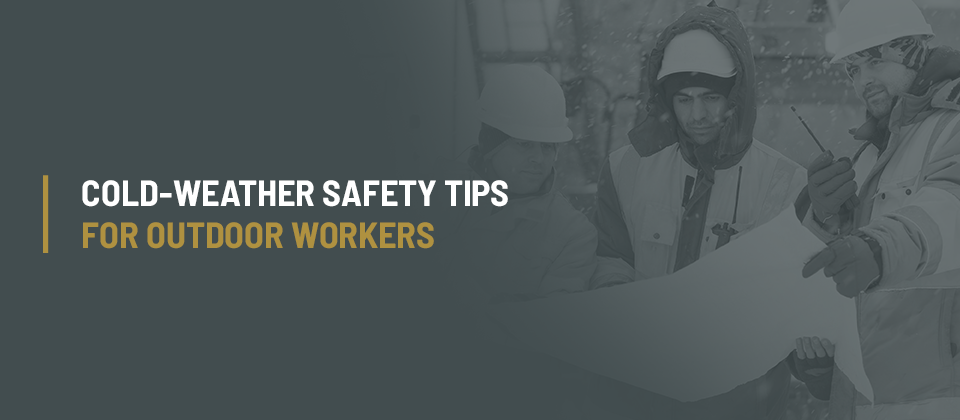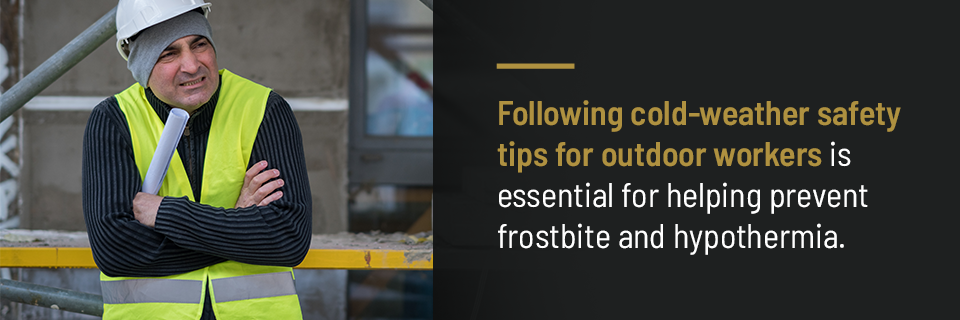The onset of winter in Pennsylvania typically means several months of cold, snowy weather — which can create hazardous conditions for employees. Snow, ice and freezing temperatures can pose a significant risk to outdoor employees who face exposure to the elements. Even individuals who work in factories, stores, offices and other temperature-controlled environments cannot escape the threat entirely.
The most recent figures available for cold-weather injuries from the U.S. Bureau of Labor Statistics come from 2017. In that year, over 20,000 workers sustained injuries or contracted illnesses on the job because of snow, ice or sleet. Nationally, the rate of such injury and illness is 1.7 workers per 10,000 employees. In Pennsylvania, the rate is slightly lower, with 1.5 workers per 10,000 missing work because of injuries or illnesses caused by snow, ice or sleet.
Fortunately, workers and employers can take several steps to minimize the risk of workplace injuries during the winter. Below, we’ll provide some extreme cold safety tips, discuss ways to help prevent cold-weather injuries and explain what to do if injuries occur despite your best efforts.
How to Protect Yourself from Cold Weather
If you work in Pennsylvania, the following winter workplace safety tips can help to prevent a serious accident or injury.
1. Eat and Drink Enough
Your body needs nutrients to keep warm in frigid temperatures. Getting enough food during the day is critical. Make sure you consume enough carbohydrates to keep your energy levels high and give yourself the fuel you need to thrive in the cold. Extremely cold, dry conditions can also be dehydrating, especially if the warm clothing you wear makes you sweat. Dehydration leads to symptoms such as dizziness, fatigue and nausea, so make sure you drink extra fluids throughout the day to keep your workplace effectiveness and well-being high.
2. Take Breaks From the Cold
Taking breaks from the cold is essential for helping prevent grave conditions like frostbite and hypothermia. Taking several well-spaced breaks throughout the day helps keep your core body temperature high. Taking breaks can warm up your fingers and toes if they’re starting to go numb. Short breaks in winter weather can make you more productive as well as protecting your health — make sure to take them.
3. Stay as Dry as Possible
Becoming soaked by rain or snow makes you much more vulnerable to frostbite and hypothermia because it lowers your body temperature. A person who becomes immersed in cold water can lose body heat up to 25 times faster than a person exposed to the same temperature in the form of cold air. Bundling up in snow gear is great, but make sure your clothing can also keep you dry. Waterproof hats gloves, mittens, boots, coats and coveralls will all help keep you dry and cozy in winter weather. Wearing a moisture-wicking layer close to your skin helps keep sweat off your body as well. It’s also a good idea to bring a couple of spare sets of clothing to work so that if you get soaked, you can change into warm, dry clothes.
4. Implement Safe Driving Practices
If you drive for a living, you probably spend a lot of time on the road in bad weather. Make sure you’ve prepared your vehicle for driving in snow and ice. Don’t travel faster than the conditions allow, and give the driver in front of you plenty of room. Keep supplies such as jumper cables, tow chains, blankets, emergency flares, flashlights and shovels in the vehicle — just in case you become stranded during a storm.
5. Safeguard Against Slips and Falls
While slipping and falling is a year-round hazard in many businesses, snow and ice can make the problem worse in winter. Your employer should help by keeping parking lots and exterior walkways clear and interior floors dry. You can also contribute to your safety by wearing slip-resistant footwear and paying close attention to where you’re walking.
6. Avoid Carrying Heavy Loads
If you move or lift heavy items while outdoors in winter weather, carry a lighter load than usual. Excess weight can compromise your balance when you’re traversing snow- or ice-covered surfaces. And if you’re part of the snow removal crew at your workplace, avoid overexerting yourself when you’re shoveling to prevent back and muscle injuries as well as cardiovascular events. Take a rest if you start to get tired.
Signs of Hypothermia and Frostbite
Following cold-weather safety tips for outdoor workers is essential for helping prevent frostbite and hypothermia. But sometimes these conditions occur anyway, and when they do, they can have severe and long-lasting effects. If left untreated, frostbite can lead to the loss of extremities, and untreated hypothermia can be fatal.
Knowing how to spot the warning signs of hypothermia and frostbite is critical to preventing these serious medical conditions from escalating. Monitor yourself and your coworkers for these warning signs throughout your outdoor work periods.
Some of the signs of hypothermia include the following:
- Shivering (though people with severe hypothermia may stop shivering as their heat regulation systems stop functioning)
- Reduced coordination
- A slow, weak pulse
- Drowsiness, confusion or loss of consciousness
- Slurred speech
And some of the signs of frostbite include the following:
- Tingling, itching, stinging or burning skin
- Very cold, numb, hard, waxy or pale skin
- Dark blue or even black skin in advanced cases
- Swelling or blisters on the extremities when the skin thaws
If you observe any of the above hypothermia symptoms, inform your supervisor right away. OSHA cold weather safety guidelines also recommend taking the following steps:
- Seek emergency medical care immediately. If the person’s symptoms are severe, call 911.
- Move the affected person to a warm area.
- Remove all wet clothing and replace it with dry clothing.
- Cover the person’s body, neck and head with blankets and a vapor barrier such as a tarp or garbage bag. Do not cover the face.
- Place warm water bottles or hot packs around the person’s torso.
- Give warm, sweetened fluids if the person is alert, but do not give alcohol. Never try to give fluids to an unconscious person.
If you observe any of the signs of frostbite, follow the steps above for hypothermia. Take these extra steps as well:
- Apply a clean, dry bandage to any potentially frostbitten areas.
- Do not rub the frostbitten areas.
- Do not rewarm frostbitten areas by submerging them in warm water. A cycle of warming and refreezing can cause extensive tissue damage in frostbitten patients.
Workers at Risk for Cold-Weather Injuries
Several categories of workers are at increased risk of sustaining cold-weather injuries. Some of those workers include:
- Road and building construction workers
- Grounds and maintenance crews
- Emergency personnel such as police officers, firefighters, EMTs and wilderness rescue teams
- Military personnel
- Airport personnel
- Postal workers
- Trash collectors
- Utility workers
- Food-processing workers
- Biological field employees
- Dockworkers and fishing boat crews
- Truckers
- Farmers and ranchers
- Other agricultural workers
- Oilfield workers
- Mine and quarry workers
- Warehouse and cold-storage employees
- Hunting guides
All employees should take steps to protect themselves from cold-weather injuries at work. Employers are also responsible for protecting their employees. But if you belong to one of these categories of employees, your risk is especially high. In that case, take extra precautions to keep warm, dry and safe and lower your risk of sustaining an injury.
Your Employer’s Responsibility
During the cold winter months, it’s your employer’s responsibility to do the following:
- Provide training: Employers should provide training so employees know how to use safe methods for activities like shoveling snow, clearing ice and performing their everyday outdoor duties. Employees should also receive training on how to take breaks appropriately during these tasks. To help prevent injury, employers should ask employees to perform only those tasks for which they have received adequate training. Employers should also train their employees to recognize the signs of frostbite and hypothermia and to provide first aid for themselves and others.
- Reduce the risk of injury: Employers should use ice melt to keep steps and walkways free from ice so employees can traverse the property safely. Icy ladders and snowy or icy roofs can also pose a serious risk. Icy ladders can cause employees to slip, fall and injure themselves, and ice dams on the room can lead to the formation of heavy icicles. Both icicles and sheets of snow from rooftops can fall and injure workers below. Employers should make sure ladders are stored in secure, dry places and that trained professionals remove snow and ice from the roof promptly.
- Use safe work practices: Employers should use safe practices at work to minimize the risk of injury. Allowing frequent breaks to warm up, sending workers out with partners or teams rather than alone, and providing training and safe walkways are some of the work practices that help maximize employee safety and well-being during cold weather.
- Provide warm, protective clothing: Employers should provide warm, protective apparel for employees required to work outside for extended periods. Because frostbite and hypothermia pose a risk in subfreezing temperatures, winter safety for outdoor workers should include wearing several removable layers of clothing. Employers can help keep employees safe and healthy by providing these items in the workplace, especially items to protect the hands, feet, ears and face.
Can I Get Compensated for a Cold-Weather Injury?
Even if you follow these workplace safety tips during winter, you could experience an injury. If you get hurt while on the job and are unable to work, you may be eligible for workers’ compensation benefits to cover lost wages and medical expenses. Under Pennsylvania law, you should report your injury to your employer as soon as possible. However, you must report it within the first 21 days to maintain your right to receive benefits from the date of your injury.
Although you may be entitled to receive workers’ comp payments, your employer could deny your claim. A knowledgeable workers’ compensation attorney can help you get the benefits you deserve.
Contact Frommer D’Amico for Help With Your Workers’ Comp Claim
If you’re in Central Pennsylvania or the surrounding area, the certified workers’ compensation attorneys at Frommer D’Amico can assist you if your employer denies your claim. We’ll implement an effective legal strategy to achieve the most favorable outcome in your situation.
Contact us online or call us at 717-400-1000 for a free case review today.



